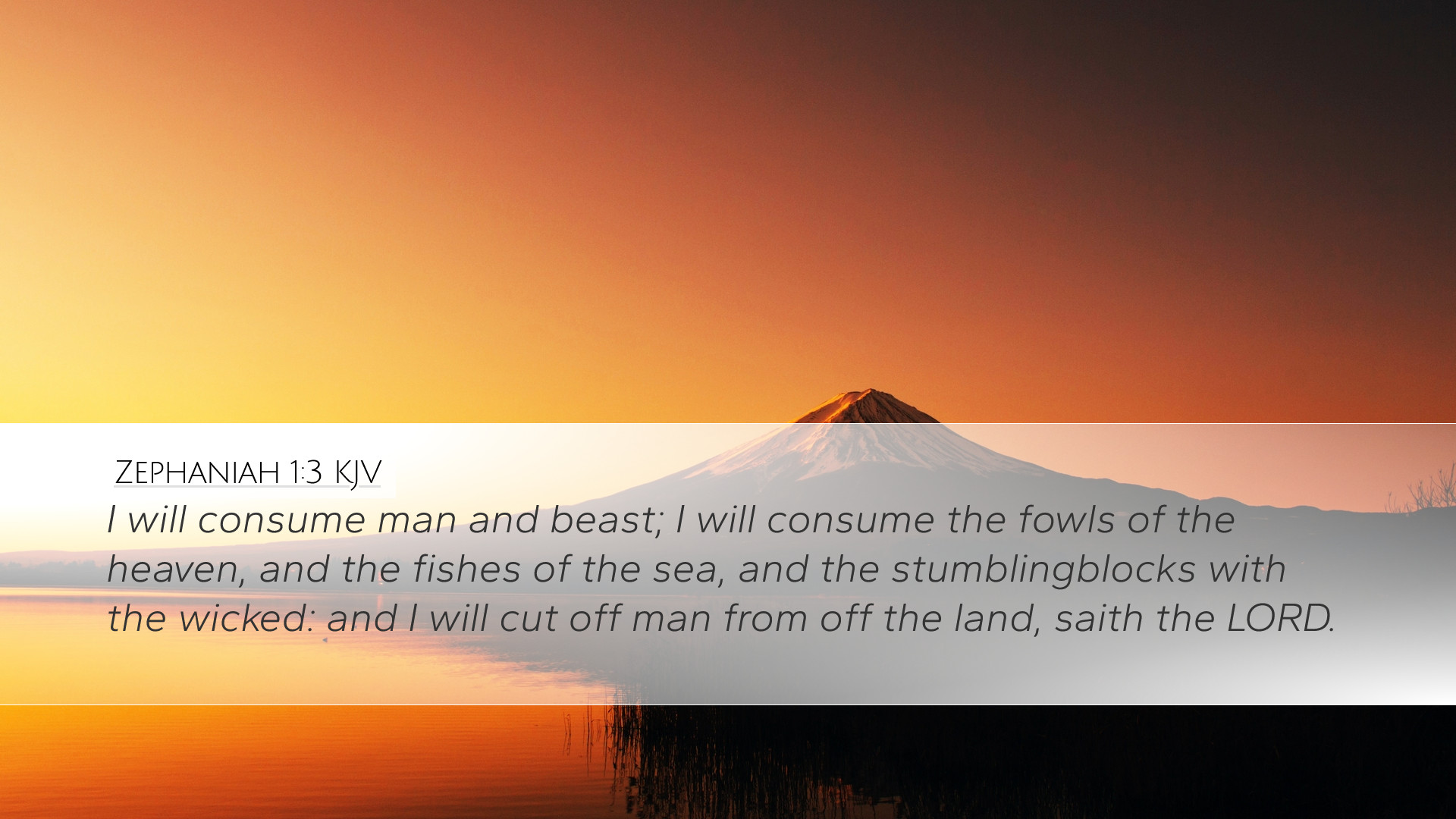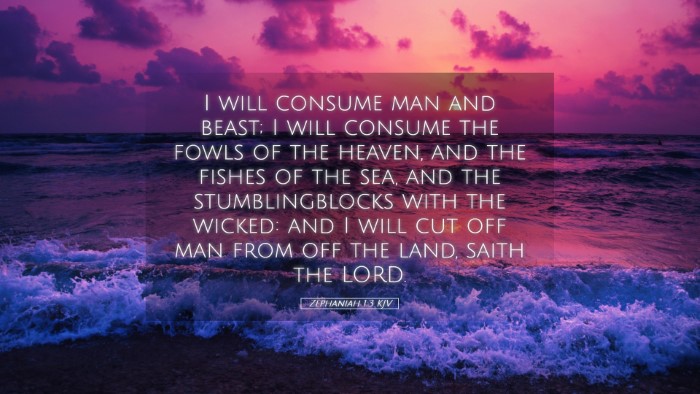Old Testament
Genesis Exodus Leviticus Numbers Deuteronomy Joshua Judges Ruth 1 Samuel 2 Samuel 1 Kings 2 Kings 1 Chronicles 2 Chronicles Ezra Nehemiah Esther Job Psalms Proverbs Ecclesiastes Song of Solomon Isaiah Jeremiah Lamentations Ezekiel Daniel Hosea Joel Amos Obadiah Jonah Micah Nahum Habakkuk Zephaniah Haggai Zechariah MalachiZephaniah 1:3
Zephaniah 1:3 KJV
I will consume man and beast; I will consume the fowls of the heaven, and the fishes of the sea, and the stumblingblocks with the wicked: and I will cut off man from off the land, saith the LORD.
Zephaniah 1:3 Bible Commentary
Commentary on Zephaniah 1:3
Bible Verse: "I will consume man and beast; I will consume the fowls of the heaven, and the fishes of the sea, and the stumbling blocks with the wicked; and I will cut off man from off the land, saith the Lord."
The book of Zephaniah is one of the twelve minor prophets in the Old Testament, and it carries profound theological implications, especially concerning God's judgment and the holiness of His character. In Zephaniah 1:3, the prophet delivers a stark message regarding impending judgment, encapsulating the severity and totality of God's impending wrath.
General Overview
Zephaniah prophesied during a time when Judah was indulging in idolatry and sinful practices. The people had turned away from Yahweh and were engulfed in moral corruption and spiritual desolation. This verse stands at the forefront of a series of declarations about God's plan to purge the land of sin and restore holiness.
Insights from Matthew Henry
Matthew Henry emphasizes the comprehensive scope of God’s judgment in this passage. He notes that the terms “man and beast” and “fowls of the heaven” indicate that God's judgment will affect all of creation. This reflects an understanding that sin has repercussions beyond humanity and impacts the natural order. Henry points out:
- Divine Authority: God makes it clear that He holds authority over all creation, and He does not hesitate to exercise it in response to humanity's transgressions.
- Totality of Judgment: The mention of "fowls" and "fishes" illustrates the comprehensive nature of the judgment — no aspect of creation will be left untouched.
Thoughts from Albert Barnes
Albert Barnes provides additional illumination on this verse, offering a theological reflection on the nature of sin and its consequences:
- The Seriousness of Sin: Barnes articulates that the mention of both "man and beast" underscores the severe nature of human sin, which has led to divine displeasure affecting the entire created order.
- Divine Mourning over Sin: He notes that the very judgment of God serves as a mourning state for the broken creation, lamenting over the destruction that sin brings.
Analysis by Adam Clarke
Adam Clarke’s exegesis draws attention to the prophetic significance of the verse and the broader implications for understanding God’s judgment:
- Symbolism of Consumption: Clarke elucidates that the term “consume” signifies a complete destruction that purifies and removes iniquity. This purification is essential for the eventual restoration of creation.
- Moral Foundations: He highlights that the verse serves as a reminder that the moral foundations upon which societies are built matter significantly to God and that their erosion leads to destruction.
Theological Implications
The theological implications of Zephaniah 1:3 are profound. This verse confronts believers with the reality of divine judgment, calling them to reflect on the seriousness of sin and the need for repentance:
- God’s Sovereignty: The comprehensive scope of God's judgment points to His sovereignty over all creation. He is not only the Creator but also the ultimate judge of all life.
- The Holiness of God: The holiness of God necessitates judgment against sin. This verse serves as a stark reminder of the purity required for communion with the holy God.
- Hope for Restoration: This stark warning can also be viewed as a prelude to hope. The judgment mentioned leads to a space for restoration, much like the prophetic tradition of calling people back to repentance.
Application for Today's Believers
For contemporary readers of scripture and especially for pastors and scholars, this verse invites deep reflection and practical application:
- Call to Holiness: This verse urges believers to pursue holiness and righteousness, recognizing the call to live in accordance with God's standards.
- Understanding God’s Character: The character of God as just and holy should inform our understanding of His grace and mercy — they are not in contradiction with His judgment.
- Encouragement in the Face of Evil: Even amidst societal decay, God’s ultimate plan to cleanse and restore is a source of hope for believers, urging them to remain faithful.
Conclusion
In conclusion, Zephaniah 1:3 serves as a poignant reminder of the seriousness of sin and the inevitability of divine judgment. It challenges believers to reflect on their relationship with God and the world while recognizing God's ultimate authority and the hope of restoration through repentance. The combined insights from the public domain commentaries of Matthew Henry, Albert Barnes, and Adam Clarke provide a rich foundation for deeper understanding and application of this significant verse.


